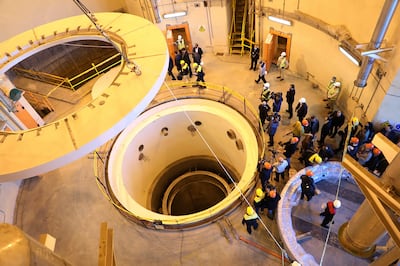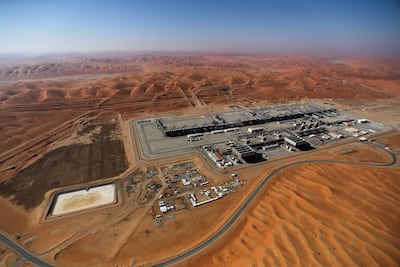Iran is “galloping ahead” with its uranium enrichment programme and continues to put up barriers to inspections, the head of the global nuclear watchdog has said.
Rafael Grossi, director general of the International Atomic Energy Agency, stressed that Tehran must abide by the nuclear proliferation treaty it signed up to.
“Iran is the only non-nuclear weapon state which is enriching uranium at this very, very high level – very close to weapons grade,” he told The National.
“I'm not saying they have a nuclear weapon, I'm saying this is sensitive. And when you're doing that … you abide by the rules,” he said.
IAEA director general
The IAEA’s latest report found Iran has increased the rate at which it is producing near weapons-grade uranium, reversing a slowdown that started in mid-2023.
Mr Grossi said Iran's push for high-grade uranium comes at a time of huge tension in the Middle East, with the war in Gaza fuelling hostility towards Israel and its allies.
Daily barrages of missiles and drones fired by the Iran-backed Houthi group in Yemen have created an international shipping and security crisis in the Red Sea.
Mr Grossi said dialogue remains open with Iran, which has claimed its programme is for civilian use – even amid sabre-rattling against Israel and other adversaries.
“A snapshot shows a programme which is galloping ahead, moving ahead with ambitious goals. We have nothing against that. But we say the visibility of the international inspectorate, the IAEA, must be commensurate with those activities.”

Western powers say otherwise – that Tehran wants nuclear weapons to threaten its enemies.
Even if Iran's nuclear programme is intended for civilian use, Mr Grossi said, it is not abiding by its obligations.
“Iran is party to the nuclear non-proliferation treaty, they should abide by this commitment,” he said.
“Iran should do much more than it's doing.”
Mr Grossi said Tehran continues to bar certain inspectors from its facilities, based on nationality.
“This of course is contrary to the spirit of our work,” he said. “This is very, very counterproductive.”
Saudi Arabia's nuclear sprint
Turning to the Middle East's nuclear future, Mr Grossi said Saudi Arabia is on the verge of a sprint to produce civilian nuclear power.
“This will be of course a game changer in terms of the energy landscape of the world and of the Gulf. It's very wise that as a country, just as the United Arab Emirates did a few years ago, they now look at diversification,” he said.
Mr Grossi, who visited Riyadh last month, said the government is in the process and building up the human workforce and the expertise it will need.
“They are on the verge of receiving their first research reactor, built by an Argentine company, which will be a tool for training their engineers, their nuclear physicists.
“They are interested to move fast, just like the UAE did.”

Mr Grossi said the UAE remains a strong example of a nation that can make civilian nuclear energy a part of its energy mix in a very short space of time.
“One of the criticisms that has been addressed to the nuclear industry has been that it's too slow and too expensive. Well, what we see at Barakah is a clear demonstration that it needn't be.
“I've been in nuclear diplomacy and nuclear work for more than 30 years and can tell you that is it very rare to see a project where you go from zero to being a fine nuclear producer within a decade, which has been amazing.”
At Cop28 in Dubai last month, conversations around nuclear energy took centre stage.
The need to develop nuclear energy, at a time when fossil fuels will be gradually phased out, was part of the final text that all countries agreed on.
“It's a return to realism,” Mr Grossi said.
“Cops were places where the word 'nuclear' was taboo. And now at the end of the conference, you have a final document that says nuclear should be accelerated. So I think the world should take notice, there will be important outcomes and consequences [from Cop28].”

